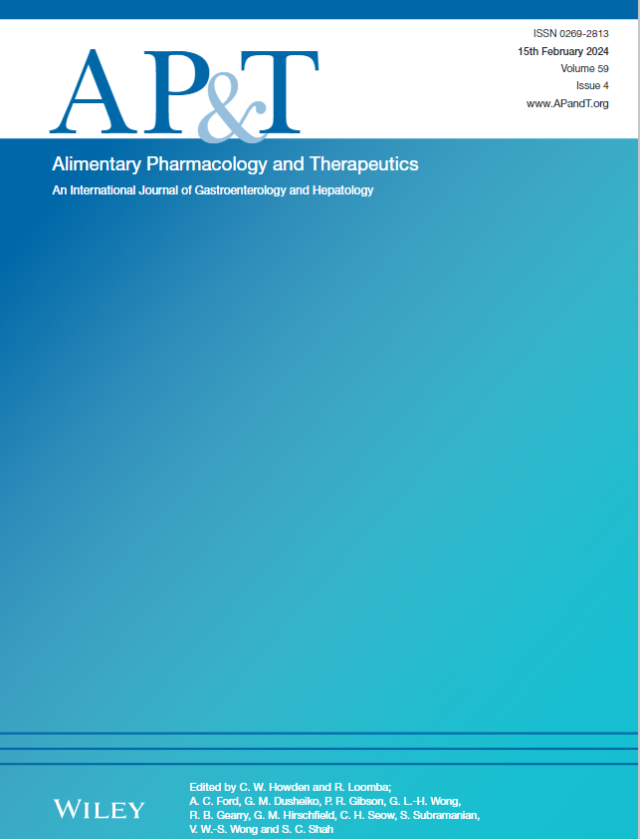Primary Sclerosing Cholangitis in the Absence of Inflammatory Bowel Disease Increases the Risk of Colorectal Cancer: A Multi-Centre Propensity Score Matched Analysis.
IF 6.7
1区 医学
Q1 GASTROENTEROLOGY & HEPATOLOGY
引用次数: 0
Abstract
INTRODUCTION Patients with primary sclerosing cholangitis (PSC) and concomitant inflammatory bowel disease (IBD) are at increased risk of colorectal cancer (CRC). However, the risk of CRC in patients with PSC without IBD remains uncertain. We aimed to evaluate the risk of CRC in patients with PSC without a history of IBD using a large national database. METHODS We conducted a retrospective cohort study using the TriNetX database to identify patients ≥ 18 years with PSC. Patients were then divided into two groups, PSC with IBD (PSC-IBD cohort) and PSC without IBD (PSC non-IBD cohort), and were matched with patients without a history of PSC or IBD (non-PSC/non-IBD group) by using 1:1 propensity score matching. The primary outcome was the risk of first diagnosis of CRC. With censoring applied, Kaplan-Meier analysis with hazard ratios (HRs) and 95% CIs was used to compare time-to-event rates at daily time intervals. RESULTS PSC patients without IBD were at increased risk of CRC compared to the non-PSC/IBD cohort (aHR = 2.91; 95% CI: 1.6-6.0). Patients with PSC and IBD exhibited a higher risk of CRC (aHR = 6.5; 95% CI: 3.78-11.2), especially among the UC cohort (aHR = 6.3; 95% CI: 3.2-12.4). Patients with PSC were at increased risk of various gastrointestinal malignancies (aHR = 10.5; 95% CI: 7.3-15; p < 0.0001), including hepatobiliary cancers, pancreatic cancer, and hepatocellular carcinoma. DISCUSSION Our findings provide real-world evidence that PSC is an independent risk factor for colorectal cancer, even in the absence of concomitant IBD. These results support the need for further research to determine whether patients with isolated PSC may benefit from tailored CRC surveillance strategies.无炎症性肠病的原发性硬化性胆管炎增加结直肠癌的风险:多中心倾向评分匹配分析
原发性硬化性胆管炎(PSC)合并炎症性肠病(IBD)患者发生结直肠癌(CRC)的风险增加。然而,无IBD的PSC患者发生CRC的风险仍不确定。我们的目的是使用一个大型的国家数据库来评估没有IBD病史的PSC患者发生CRC的风险。方法:我们使用TriNetX数据库进行回顾性队列研究,以确定≥18岁的PSC患者。然后将患者分为两组,伴有IBD的PSC (PSC-IBD队列)和无IBD的PSC (PSC非IBD队列),并通过1:1的倾向评分匹配与无PSC或IBD病史的患者(非PSC/非IBD组)进行匹配。主要终点是首次诊断为结直肠癌的风险。采用筛选后,Kaplan-Meier分析采用风险比(hr)和95% ci比较每日时间间隔的时间-事件发生率。结果与非psc /IBD组相比,无IBD的spsc患者发生CRC的风险增加(aHR = 2.91;95% ci: 1.6-6.0)。PSC和IBD患者发生CRC的风险更高(aHR = 6.5;95% CI: 3.78-11.2),尤其是UC队列(aHR = 6.3;95% ci: 3.2-12.4)。PSC患者发生各种胃肠道恶性肿瘤的风险增加(aHR = 10.5;95% ci: 7.3-15;P < 0.0001),包括肝胆癌、胰腺癌和肝细胞癌。我们的研究结果提供了真实的证据,证明PSC是结直肠癌的独立危险因素,即使没有合并IBD。这些结果支持进一步研究的必要性,以确定孤立性PSC患者是否可以从定制的CRC监测策略中获益。
本文章由计算机程序翻译,如有差异,请以英文原文为准。
求助全文
约1分钟内获得全文
求助全文
来源期刊
CiteScore
15.60
自引率
7.90%
发文量
527
审稿时长
3-6 weeks
期刊介绍:
Alimentary Pharmacology & Therapeutics is a global pharmacology journal focused on the impact of drugs on the human gastrointestinal and hepato-biliary systems. It covers a diverse range of topics, often with immediate clinical relevance to its readership.

 求助内容:
求助内容: 应助结果提醒方式:
应助结果提醒方式:


